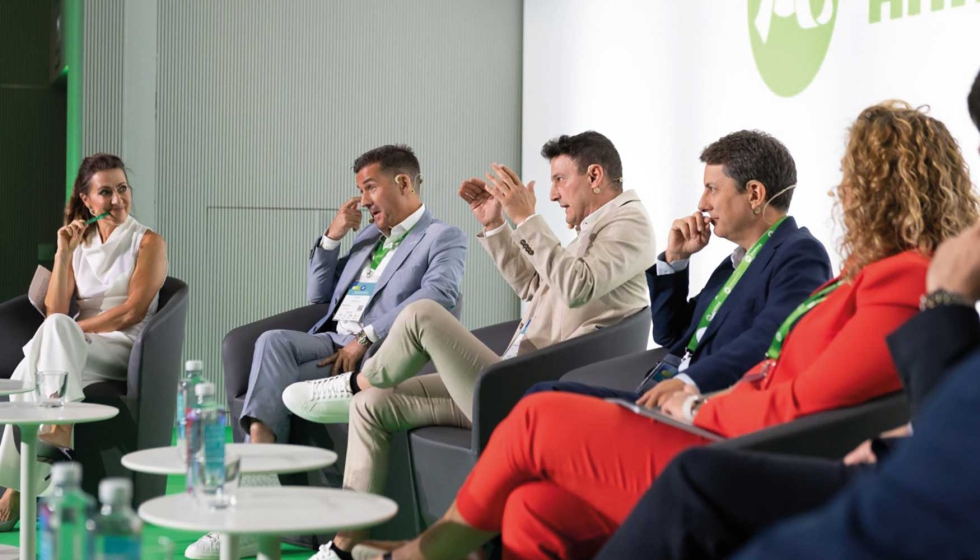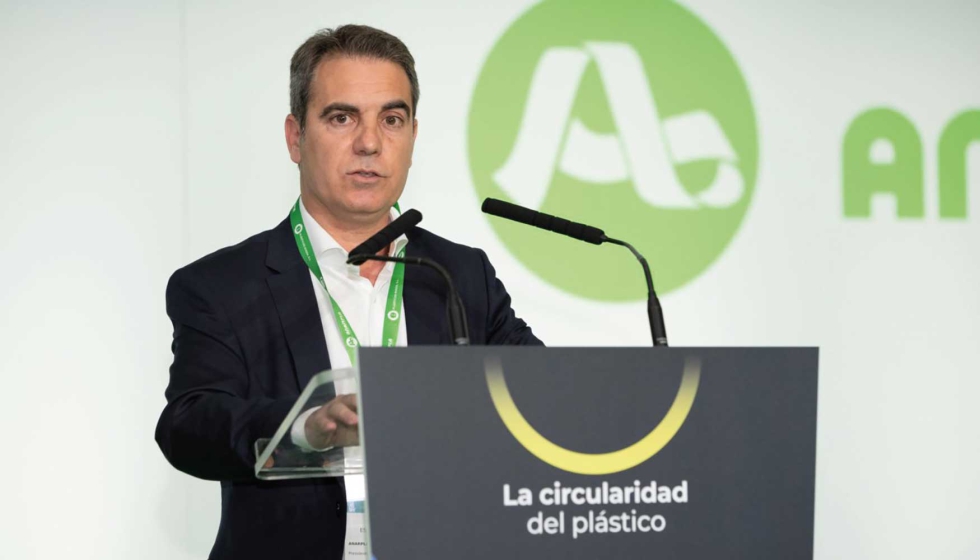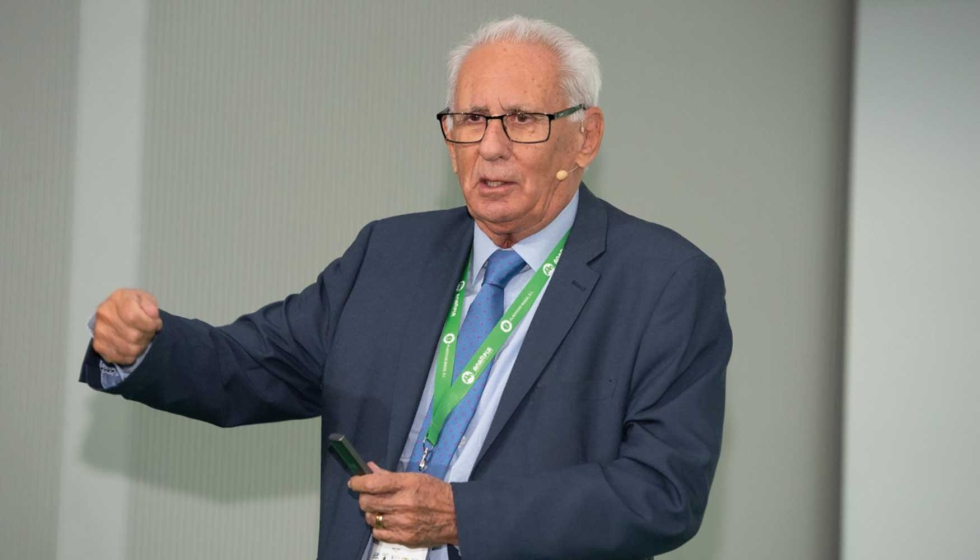The 2nd National Plastics Recycling Congress, which took place on 17 May at the Cívitas Metropolitano stadium in Madrid and was attended by 410 professionals, confirmed the strengths of the Spanish sector. Despite the decrease in the consumption of recycled plastics in 2022 as a result of the low price of virgin plastics, the national industry is aware of the strengths with which to overcome current and future challenges.
During the event, organised by Anarpla and presented by journalist Ángeles Blanco, several of the speakers warned about the consequences that new legal regulations such as Royal Decree 1055/2022 on Packaging and Packaging Waste, Law 7/2022 on Waste and Contaminated Soil for a Circular Economy or the future European Packaging and Packaging Waste Regulation will have on the activity.
As regards national regulations, their entry into force has led to an increase in bureaucracy and a duplication of tasks that in many cases has made it necessary to hire new employees dedicated exclusively to data entry, as regretted by the Operations Director of MANC Recyclaplast, Lidia Navarro, who urged the Public Administrations to simplify these tasks, avoiding duplication that hinders the efficiency of companies.
On the proliferation of Extended Producer Responsibility Collective Systems (EPRCS), Navarro said that “they are growing like mushrooms”, adding that she hopes that their development does not compromise free competition.
César Alonso, CEO of Plásticos Alser, regretted that eco-design has not been taken into account in recent decades, which hinders both the reuse and recycling of plastics. Alonso gave the example of plastics used in the automotive industry, which in many cases include several materials. However, he was confident about the foreseeable increase in demand for recycled plastics in this sector, given that major car manufacturers are evaluating the inclusion of this type of secondary raw material in their vehicles. Alonso sent out an optimistic message by predicting that “the future for the sector is positive”.
Both Navarro and Alonso took part in the second of the round tables held at the event. In this block, the managing partner of Inserplasa, Juanjo Sánchez, summarised the changes that have taken place in the recycling of plastics, which in Spain has gone from carrying out a multitude of tasks manually to using modern techniques, equipment and technologies that have managed to increase the efficiency of the process which, nevertheless, continues to have energy costs as one of its greatest concerns.
 The director of Saica Natur Cycle Plus, Luis Pellejer, stated that the sector is immersed in a transformation process as a result of the change from a linear to a circular production model, which opens up great opportunities for the entire plastics recycling value chain. Given that the regulations approved and in the process of being drafted establish “very ambitious deadlines and objectives”, Pellejer was in favour of the legal framework being stable and establishing rules of the game that can be accepted by the sector and society.
The director of Saica Natur Cycle Plus, Luis Pellejer, stated that the sector is immersed in a transformation process as a result of the change from a linear to a circular production model, which opens up great opportunities for the entire plastics recycling value chain. Given that the regulations approved and in the process of being drafted establish “very ambitious deadlines and objectives”, Pellejer was in favour of the legal framework being stable and establishing rules of the game that can be accepted by the sector and society.
On the tax approved for single-use packaging, Pellejer distanced himself from several of the complaints voiced by some of the congress participants, pointing out that the impact on activity has been low. He did regret that the new tax has not created a greater demand for recycled plastic and pointed out that the technical limitation (quantity/quality) has not yet been overcome, so it is necessary to increase the investments in R+D+i that are already being made.
 The managing director of Clear Pet, Francisco Ruiz Quílez, stated that the companies that form part of the plastics recycling value chain must manage, on the one hand, the expectations of customers and, on the other, the uncertainties generated by the new legal regulations, which – he proposed – must establish minimum percentages for the use of recycled plastics.
The managing director of Clear Pet, Francisco Ruiz Quílez, stated that the companies that form part of the plastics recycling value chain must manage, on the one hand, the expectations of customers and, on the other, the uncertainties generated by the new legal regulations, which – he proposed – must establish minimum percentages for the use of recycled plastics.
The entire value chain represented
The congress, which started with a slight delay, began with the inaugural speech by the president of Anarpla, David Eslava, who stressed the need to establish a stable market for recycled plastics that is not linked to the prices of virgin plastic. He also defended the establishment of mandatory minimum contents of recycled plastics to encourage demand for them and advocated the establishment of measures to promote green public procurement.
Eslava pointed out that in 2021 Spain was the second country in Europe with the second highest plastic recycling capacity. Despite this good data, the president of Anarpla drew attention to the slowdown in recycling, which grew by 20% that year to do so at a much slower rate in 2022, a year in which the increase was 2.9%. The president of Anarpla also called for harmonised legislation at European level in order to avoid imbalances between different EU countries.
After him, Margarita Ruiz-Aja, Deputy Director General for the Circular Economy of the Ministry for Ecological Transition and the Demographic Challenge, was in charge of addressing the audience. In her speech, she stated that the current linear model in the economy cannot be maintained and she was in favour of changing the waste management model to increase its efficiency.
 Ruia-Aja pointed out that in 2020 – the last year for which official data is available – 106 million tonnes of waste were managed in Spain, of which 86 million tonnes were treated, with the remaining 45% being sent to landfill or recovered as energy. With regard to municipal waste, 40% of the total was recycled, although only 20% of the amount collected was collected separately. For plastic packaging, 41% was recycled. This picture allowed the deputy director general for the Circular Economy to point out that “we are not in a good situation, not at European level either”, a circumstance which, she proposed, makes it all the more necessary “to work together to improve the results”.
Ruia-Aja pointed out that in 2020 – the last year for which official data is available – 106 million tonnes of waste were managed in Spain, of which 86 million tonnes were treated, with the remaining 45% being sent to landfill or recovered as energy. With regard to municipal waste, 40% of the total was recycled, although only 20% of the amount collected was collected separately. For plastic packaging, 41% was recycled. This picture allowed the deputy director general for the Circular Economy to point out that “we are not in a good situation, not at European level either”, a circumstance which, she proposed, makes it all the more necessary “to work together to improve the results”.
The technical advisor of the Subdirectorate General of Circular Economy of Miteco, Pablo Rodríguez Porras, reviewed the objectives, deadlines and measures that are being negotiated within the European Union on the proposal for the new packaging regulation, which advocates prevention in the generation of waste, promoting eco-design, reuse and recycling, and defends a minimum percentage of recycled plastics.
After the intervention of the general director of Plastics Recyclers Europe, Anotnino Furfari, his colleague in the continental collective, Mireia Boada, Project Manager of Plastics Recyclers Europe, highlighted, among other aspects, that work is currently being done on calculating the traceability of recycled plastic.
The conference continued with the presentation by Anarpla’s technical advisor, José María Alegre (who during his speech – entitled ‘What do the latest figures on plastics recycling in Spain tell us?’ – repeatedly asked Anarpla members and all those involved in the value chain to send him data in order to evaluate the evolution of the main magnitudes of the sector more closely) reviewed some of the trends experienced in recent years in the recycling of plastics.
After his speech and the break for a morning snack, the ‘Guide to green purchasing and the promotion of recycled plastic products’ block began, with the participation of Claudia García Yustos, founding partner of AD Impulsa; Alicia Martín Rodríguez, general manager of Plastics Europe Iberian Region, and Óscar Hernández Basanta, general manager of Anarpla.
 Some of the speakers who also participated in the conference were David Eslava, who addressed the attendees in his capacity as assistant to the Management of Eslava Plásticos; Paqui García Salas, Administration and Financial Director of Interval Plásticos; Natalia Campos, CEO of Enplast; Jean Henin, Chairman and CEO of Pellenc ST; Yolanda Fernández, Director of Corporate Social Responsibility and External Communication of Alcampo, and Nicolás Fuentes, Director of Public Affairs of Neste.
Some of the speakers who also participated in the conference were David Eslava, who addressed the attendees in his capacity as assistant to the Management of Eslava Plásticos; Paqui García Salas, Administration and Financial Director of Interval Plásticos; Natalia Campos, CEO of Enplast; Jean Henin, Chairman and CEO of Pellenc ST; Yolanda Fernández, Director of Corporate Social Responsibility and External Communication of Alcampo, and Nicolás Fuentes, Director of Public Affairs of Neste.
Another of the talks full of technical information, in this case with a strong legislative emphasis, was given by Sonia Albein, Mechanical Recycling Group Leader at Aimplas, who explained some details about the Guide to incorporate a management system compatible with the new Ministerial Order on the End of waste status for plastic waste treated mechanically in plastic recycling facilities.
The event was brought to a close by the general director of Anarpla, Óscar Fernández, who began his farewell speech by stressing that thanks to the recycling of plastics, more than 2.11 million tonnes ofCO2 had ceased to be emitted into the atmosphere, a milestone for which he held the entire value chain responsible. He thanked the recyclers for their efforts, but also the manufacturers and processors who are committed to the use of recycled plastic. He also highlighted the work of the administrations that promote the circular economy; of the citizens who collaborate by separating waste, thus facilitating selective collection; of the packagers who use recyclable packaging; of the machinery manufacturers, as well as the technological institutes and certification bodies.



